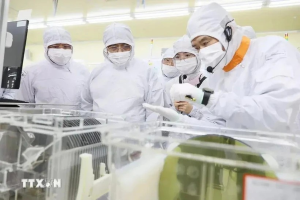
MIC promotes cooperation for artificial intelligence, semiconductor development: official
Latest
At a regular press conference of the ministry on May 13, Deputy Director of the MIC’s Authority of ICT Industry and Communications Le Nam Trung said that seeing artificial intelligence as a key technology of the fourth Industrial Revolution the ministry always accompanies and stands ready to back enterprises in the fields, ensuring that they have a sound environment to branch out their business.
 |
| Vietnam gives priority to developing human resources in the area of AI and semiconductors. (Source: VNA) |
The ministry will join hands with competent organizations and enterprises to train high-quality human resources, and work with the US-based Nvidia Corporation, a world leader in artificial intelligence computing, to build an AI establishment called Centre for Excellence while organizing international conferences to acquire experiences from leading specialists, he stressed.
Trung went on to say that Vietnam is penning a strategy to develop the semiconductor industry until 2030 with a vision to 2045, envisioning to become a center for the semiconductor chip industry by 2030 with operations in design, packaging, and testing.
The MIC was assigned to build mechanisms and supporting incentives to develop semiconductor human resources, he said, adding it will coordinate with the Ministry of Planning and Investment to carry out a project on semiconductor human resources development by 2030 with a vision to 2045, ensuring that it is by the strategy’s targets.
The two ministries will study and recommend measures to encourage technology firms’ engagement in human resources training, R&D activities, and technology transfer, he stressed.
Regarding the semiconductor industry development strategy being built and implemented in 2024 by the MIC, Trung said the ministry charted a vision that Vietnam, with a developed semiconductor industry by 2045, will be a key link in the global supply chain.
The industry will boast harmonized infrastructure in terms of human resources, technologies, and R&D, among others, making contributions to the sustainable development of the digital industry that creates a foundation for the country’s digital transformation as well as the building of digital economy and digital government, he added.

















